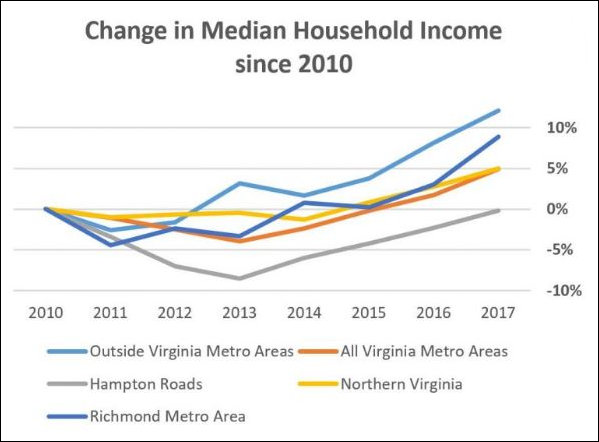
Rural Virginia may have seen a decline in the number of jobs since 2011, but get this: Incomes have been rising faster than in Virginia’s metropolitan areas — 12% since 2010 compared to just 5% for the metros, says Hamilton Lombard on the University of Virginia’s Demographics Research Group blog, StatChat. Likewise, poverty rates have fallen more in Virginia’s rural areas.
Other than Virginia’s coalfield region, which has seen a net loss in jobs and the lowest wage increases in the state’s 15 workforce investment board regions, non-metropolitan Virginia has fared pretty well. Overall wage levels remain considerably lower, of course, but the faster rise in incomes conflicts with the perception (which I no doubt have contributed to) of communities in decline.
If jobs are disappearing, how can wages be rising? Classical economic theory would predict the opposite. As a demographer, Lombard understandably offers a demographic explanation for the surprising results. The answer: migration and aging.
In much of the 20thcentury, workers moved from low income counties to high income counties in large numbers across Virginia and the nation. Workers moving to high income and more urban counties increased the urban labor supply, keeping wages down, while workers leaving low income and more rural counties shrunk the rural labor supply, forcing employers to increase productivity and wages. …
Today, an aging population–rather than residents moving away–is tightening the labor supply in many of Virginia’s rural counties and pushing wages up. Over the next couple of decades, employers in many rural counties will likely be forced to raise wages more and invest in automation to combat a projected decline in the workforce. If current trends continue, the income gap between rural and urban Virginia should close further.
Yet the economies of rural and urban Virginia appear to be heading in different directions. Shrinking working age populations in the coming decades will likely make it more difficult for rural counties to attract new employers who prefer a stable labor force. At the same time, the workforce of Virginia’s larger metro areas will continue to grow.

Leave a Reply
You must be logged in to post a comment.